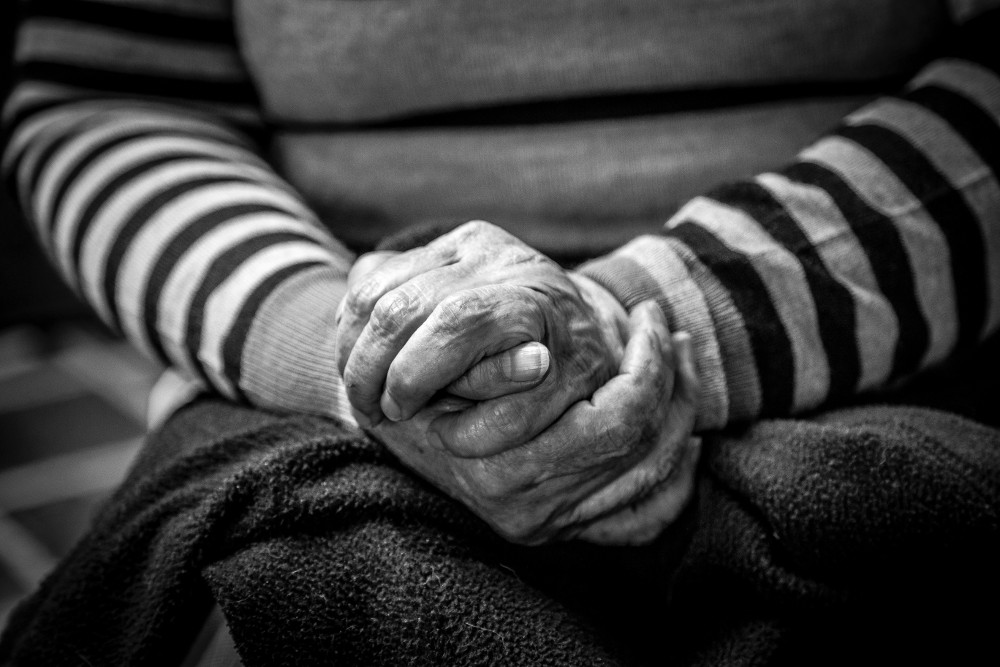
(Unsplash/Jorge Lopez)
Every Sunday afternoon, I volunteer at a nursing home with members of the Community of Sant'Egidio in Washington, D.C. Once a month we have Mass there. It's a ragtag affair, a comedy of errors, and this is why I love it.
This is why it's divine.
It begins like this. A couple dozen elderly women and men shuffle like turtles into the sitting room, walkers and wheelchairs aiding their way. Some are Catholic and some are not. It doesn't matter to us, or to them, because all are welcome.
Father Tom, a retired Missionary of Africa, prepares the makeshift altar, a round cafeteria table decorated with a white cloth and an electric candle. Susan, our piano player, sets up a broken keyboard stand on the linoleum floor and decides which hymns we'll sing. The TV still blares in the back of the room.
"Who is taking Communion at Mass today?" asks Father Tom. About a third of the congregation raises hands. It's mostly the Catholics and a few that just want to belong, which is just fine with us. We don't ask a lot of questions.
A mingled stench of urine, half-eaten food and old mop water hovers in the air. I turn off the TV and tap the portable microphone to make sure it's working. Our elderly friends watch these preparations with expectation. Something is about to happen. By some mix of presence and intention, the space becomes a sanctuary.
"I thought about you all week," my friend Mae says from her wheelchair in the front row. "It feels so good to have a friend." I pause from the frenzy of sorting and passing out song sheets and tell her I agree. But I feel ashamed at her delight. My week has been full of meetings, trips in cars and buses, to stores and restaurants and playgrounds. And she's been here in this place, thinking of me? I am humbled.
We like to have at least one resident reader, and Coreetha is our go-to. She is 90-something and lucid, and we can count on her to read at least 50 percent of the words correctly. Solid odds, considering many residents have dementia or can't see.
"I love Jesus Christ, honey, so of course I can read!" Coreetha says in her high-pitched voice. "But just tell me when it's time for me to start," she whispers conspiratorially. She's not Catholic so is never sure when "it's time" for her solo. I promise to cue her.
Coreetha reads with the drama of a televangelist, but something is always lost in translation. One Sunday we heard:
"I have filled … the dawn … days … Swat her! A weaver shuts up!"
I looked down at the actual words on my copy of the Old Testament reading from the book of Job: "I am filled with restlessness until the dawn. My days are swifter than a weaver's shuttle."
Sigh.
The Mass wouldn't be complete without someone abruptly, and loudly, leaving the room.
"I have to go to the bathroom!" Dolores shouted once while I was reading the psalm. She scurried out of the room.
"Who does she think she is?" another resident, Cecilia, muttered just loud enough so everyone could hear. Father Tom and I looked at each other, and we both almost lost it. If you weren't able to laugh, you'd have to cry.
Did I mention that nobody stands or kneels during this Mass? That even the able-bodied volunteers stay seated in solidarity with those whose bodies are broken?
It begs the question: What really matters about the Mass?
Father Tom gives a slightly different version of the same homily, no matter what Gospel passage is on deck.
Advertisement
It goes something like this: However old we are, however infirm, however lonely, we can all love someone. Even if it's the person in the bed next to us.
Everyone listens. Even the irascible Cecelia softens. Many nod their heads in agreement.
Oh yes, now this is what matters. This is the Gospel.
Like many, I have felt disappointed by the church, and right now I am angry with it, but if it allows for a celebration like this to exist, then I choose to stay. Reaching superficial, showy perfection is not the point at Mass (nor is it the point in our daily lives or the church writ large). It's about being connected, and being tethered, together, by something good. A rope we can all hold onto.
During the sign of peace, all of the volunteers make peace with all of the residents, and all of the residents make peace with other residents close to them. It is a melee of handshakes and hugging and soft kisses on dry, paper-thin cheeks.
But the moment I treasure most is the most mysterious:
"This is my Body, which will be given up for you."
During these Masses, I look at Father Tom holding up a mystery, and I look at the residents looking toward it. Yes, these are our bodies, given up and spent to their limits. But here we still are, and how thankful we are to be together.
We always end Mass with our favorite song, and everyone sings. But nobody needs a song sheet because we know it by heart.
It is "Amazing Grace."
[Dani Clark is a member of the Community of Sant'Egidio and works in communications at an international development organization. Freelance writer and anti-death-penalty advocate, she lives in Washington, D.C., with her husband and young son.]







